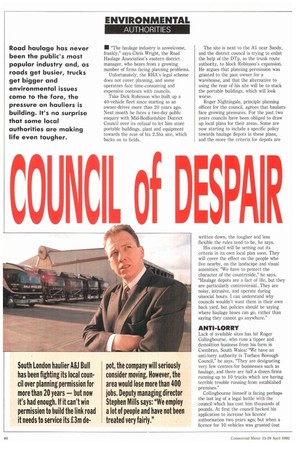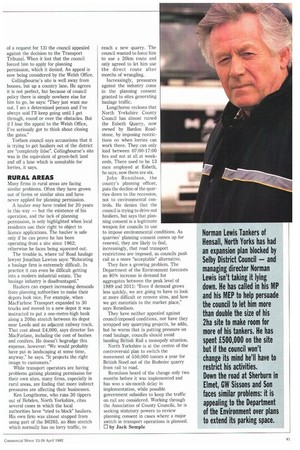* VN II ol DESPAI R Road haulage has never been the public's
Page 42

Page 43

If you've noticed an error in this article please click here to report it so we can fix it.
most popular industry and, as roads get busier, trucks get bigger and environmental issues come to the fore, the pressure on hauliers is building. It's no surprise that some local authorities are making life even tougher.
• "The haulage industry is unwelcome, frankly," says Chris Wright, the Road Haulage Association's eastern district manager, who hears from a growing number of firms facing planning problems.
Unfortunately, the RHA's legal scheme does not cover planning, and some operators face time-consuming and expensive contests with councils.
Take Dick Robinson who built up a 40-vehicle fleet since starting as an owner-driver more than 20 years ago. Next month he faces a two-day public enquiry with Mid-Bedfordshire District Council over its refusal to let him store portable buildings, plant and equipment towards the rear of his 2.5ha site, which backs on to fields. The site is next to the Al near Sandy, and the district council is trying to enlist the help of the DTp, as the trunk route authority, to block Robinson's expansion. He argues that planning permission was granted to the past owner for a warehouse, and that the alternative to using the rear of his site will be to stack the portable buildings, which will look worse.
Roger Nightingale, principle planning officer for the council, agrees that hauliers face growing pressures. For the past two years councils have been obliged to draw up local plans for their areas. Some are now starting to include a specific policy towards haulage depots in these plans, and the more the criteria for depots are written down, the tougher and less flexible the rules tend to be, he says.
His council will be setting out its criteria in its own local plan soon. They will cover the effect on the people who live nearby, on the landscape and visual amenities: 'We have to protect the character of the countryside," he says. "Haulage depots are a fact of life, but they are particularly controversial.. They are noisy, intrusive, and operate during unsocial hours. I can understand why councils wouldn't want them in their own back yard, but policies should be saying where haulage bases can go, rather than saying they cannot go anywhere."
ANTI-LORRY
Lack of available sites has hit Roger Collingbourne, who runs a tipper and demolition business from his farm in Cwmbran, South Wales: "We have an anti-lorry authority in Torfaen Borough Council," he says. "They are designating very few centres for businesses such as haulage, and there are half a dozen firms running up to 10 trucks which are having terrible trouble running from established premises."
Collingbourne himself is facing perhaps the last leg of a legal battle with the council which has cost him thousands of pounds. At first the council backed his application to increase his licence authorisation two years ago; but when a licence for 10 vehicles was granted (out of a request for 13) the council appealed against the decision to the Transport Tribunal. When it lost that the council forced him to apply for planning permission, which it denied. An appeal is now being considered by the Welsh Office.
Collingbourne's site is well away from houses, but up a country lane. He agrees it is not perfect, but because of council policy there is simply nowhere else for him to go, he says: "They just want me out. I am a determined person and I've always said I'll keep going until I get through, round or over the obstacles. But if I lose the appeal to the Welsh Office, I've seriously got to think about closing the gates."
Torfaen council says accusations that it is trying to get hauliers out of the district are "completely false". Collingbourne's site was in the equivalent of green-belt land and off a lane which is unsuitable for lorries, it says.
RURAL AREAS
Many firms in rural areas are facing similar problems. Often they have grown out of farms or similar sites and have never applied for planning permission.
A haulier may have traded for 20 years in this way — but the existence of his operation, and the lack of planning permission, is only highlighted when local residents use their right to object to licence applications. The haulier is safe only if he can prove he has been operating from a site since 1962; otherwise he faces being squeezed out.
The trouble is, where to? Road haulage lawyer Jonathan Lawton says: "Relocating a haulage firm is extremely difficult. In practice it can even be difficult getting into a modern industrial estate. The haulage industry is disadvantaged."
Hauliers can expect increasing demands from planning authorities to make their depots look nice. For example, when MacFarlane Transport expanded to 30 trucks and moved to a new depot it was instructed to put a one-metre-high bank along a 200m stretch between its depot near Leeds and an adjacent railway track. That cost about £4,000, says director Ian MacFarlane, including the cost of bushes and conifers. He doesn't begrudge this expense, however: "We would probably have put in landscaping at some time, anyway;" he says. "It projects the right image to customers."
While transport operators are having problems gaining planning permission for their own sites, many firms, especially in rural areas, are finding that more indirect pressures are affecting their businesses.
Ken Longthorne, who runs 30 tippers out of Hebden, North Yorkshire, cites several cases in which the local authorities have "tried to block" hauliers. His own firm was almost stopped from using part of the B6265, an 81trn stretch which normally has no lorry traffic, to reach a new quarry. The council wanted to force him to use a 20km route and only agreed to let him use the direct route after months of wrangling.
Increasingly, pressures against the industry come in the planning consent granted to sites generating haulage traffic.
Longthorne reckons that North Yorkshire County Council has almost ruined the Esbeth Quarry, now owned by Bardon Roadstone, by imposing restrictions on when lorries can work there. They can only load between 07:00-17:00 hrs and not at all at weekends. There used to be 13 men employed at Esbeth, he says, now there are six.
John Rennilson, the county's planning officer, puts the decline of the quarries down to the recession, not to environmental controls. He denies that the council is trying to drive out hauliers, but says that planning consent is a legitimate weapon for councils to use to impose environmental conditions. As quarries' planning consent comes up for renewal, they are likely to find, increasingly, that road transport restrictions are imposed, as councils push rail as a more "acceptable" alternative.
They face a growing problem. The Department of the Environment forecasts an 80% increase in demand for aggregates between the peak level of 1989 and 2011: "Even if demand grows less quickly, we are going to have to look at more difficult or remote sites, and how we get materials to the market place," says Rennilson.
They have neither appealed against council-imposed conditions, nor have they scrapped any quarrying projects, he adds, but he warns that in putting pressure on road haulage, councils should avoid handing British Rail a monopoly situation.
North Yorkshire is at the centre of the controversial plan to switch the movement of 550,000 tonnes a year for British Steel out of the Redmire quarry from rail to road.
Rennilson heard of the change only two months before it was implemented and has won a six-month delay in implementation, while possible government subsidies to keep the traffic on rail are considered. Working through the Association of County Councils, he is seeking statutory powers to review planning consent in cases where a major switch in transport operations is planned. 0 by Jack Semple
















































































